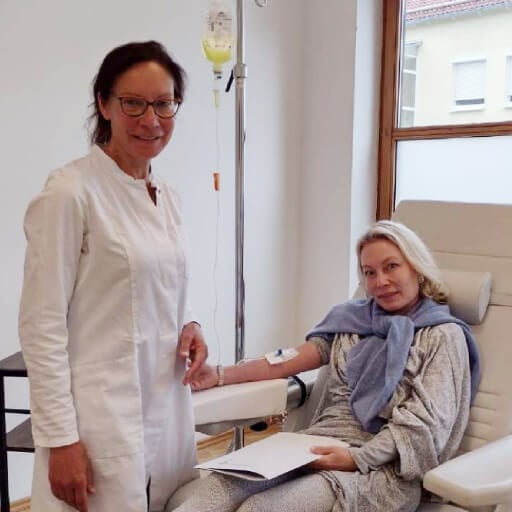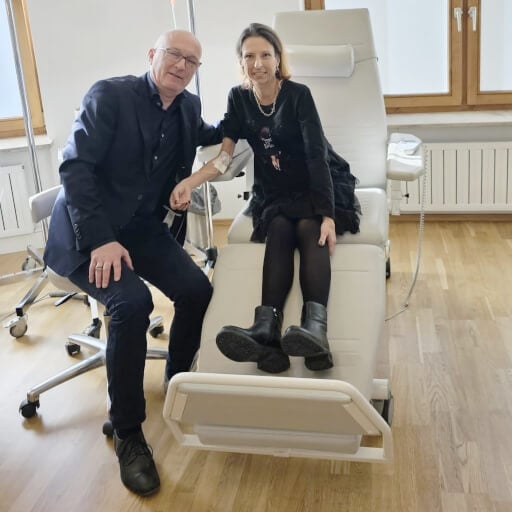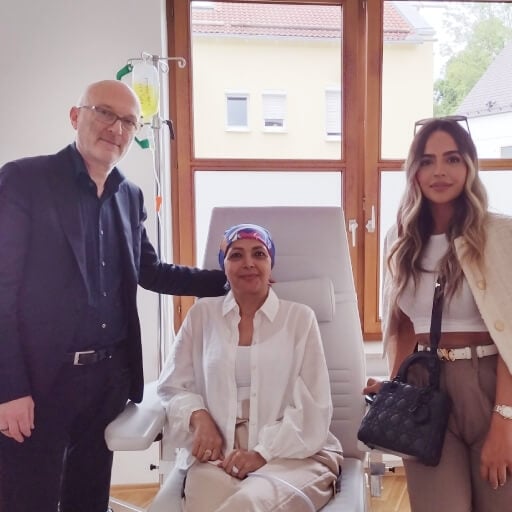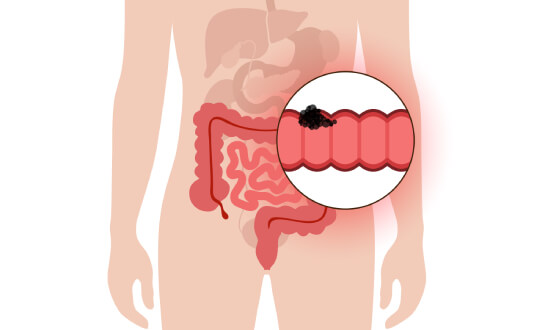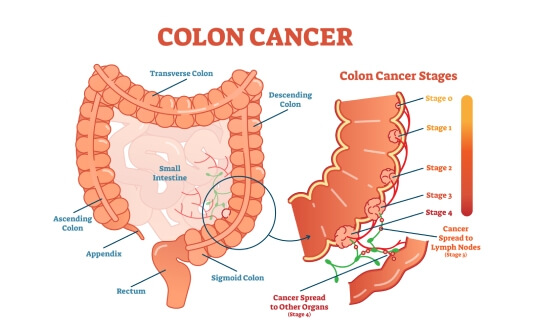تلقي تشخيص سرطان القولون في المرحلة 4 يمكن أن أمراً صعباً، لأنه يعني أن السرطان انتشر إلى أعضاء بعيدة. أنت لست وحدك - فهذه المرحلة تؤثر على 22٪ من مرضى سرطان القولون والمستقيم عند التشخيص. رغم أن العلاجات التقليدية توفر معدل بقاء على قيد الحياة لمدة خمس سنوات يبلغ 13٪، إلا أن هناك أملاً حقيقياً في الأفق. تعمل العلاجات المبتكرة في طب الأورام على تغيير النتائج – حيث تحقق العلاجات المتقدمة الآن معدلات بقاء على قيد الحياة لمدة عامين تصل إلى 60٪. توفر الأساليب الشخصية اليوم إمكانيات حقيقية لإطالة البقاء على قيد الحياة وتحسين جودة الحياة، مما يمنحك أسباباً للأمل.
ماذا يعني سرطان الأمعاء في المرحلة الرابعة: عندما ينتشر السرطان
تحدث المرحلة الرابعة من سرطان القولون النقيلي عندما تنتقل الخلايا السرطانية عبر الجهاز اللمفاوي أو مجرى الدم إلى مواقع جديدة في الجسم. المواقع الأكثر شيوعاً للنقائل تشمل ما يلي:
- الكبد (تم العثور على المرحلة 4 من سرطان القولون المنتشر إلى الكبد في من 11.8 إلى 14.4٪ من الحالات)
- الرئتين
- الصفاق (بطانة البطن)
- العقد اللمفاوية البعيدة
نظراً لتعقيد المرض في هذه المرحلة، فإن وجود فريق متعدد التخصصات من المتخصصين أمراً بالغ الأهمية لتقييم المريض وتطوير خطة علاج مُثلى. تُعد استراتيجيات العلاج فردية للغاية، اعتماداً على مواقع النقائل وقابليتها للاستئصال، وخصائص الورم، والصحة العامة للمريض، والنظام الغذائي، والأهداف الشخصية.
يمكن أن تتراوح أهداف العلاج من السعي إلى الشفاء في حالات مختارة إلى إدارة الأعراض وتعزيز جودة الحياة. يبلغ معدل البقاء التقليدي على قيد الحياة لمدة خمس سنوات حوالي 13٪، ولكن هذه الإحصائية لا تعكس تأثير العلاجات الأحدث.
خيارات العلاج القياسية: الجراحة، والعلاج الكيميائي، والعلاج الإشعاعي
خيارات علاج سرطان القولون في المرحلة الرابعة القياسية غالباً ما تتضمن مزيجاً من الأساليب.
الجراحة قد يتم النظر فيها إذا كان انتشار السرطان محدوداً، وخاصةً في مناطق قليلة في الكبد أو الرئتين والتي يمكن إزالتها جراحياً. رغم أن الجراحة في هذه المرحلة ليست شافية دائماً، إلا أنها يمكنها مساعدة المرضى على العيش لفترة أطول أو تخفيف الأعراض. الإجراءات الجراحية قد تشمل ما يلي:
- إزالة جزء القولون مع الورم الأساسي، والأعضاء البعيدة المتأثرة، والعقد اللمفاوية القريبة
- إنشاء فغر القولون أو فغر اللفائفي عند الحاجة
- وضع دعامة أثناء تنظير القولون لمعالجة المضاعفات مثل انسداد القولون
العلاج الكيميائي في كثير من الأحيان يكون العلاج الأساسي عندما ينتشر السرطان على نطاق واسع جداً بحيث لا يمكن إجراء الجراحة. قد يتم إعطاؤه قبل الجراحة لتقليص الأورام أو بعد الجراحة للقضاء على الخلايا المتبقية. يتم استخدام عدة تركيبات من الدواء الكيميائي، بما في ذلك الخيارات عن طريق الفم والوريد، وفي بعض الأحيان مع العلاجات الموجهة. قد تكون هناك حاجة لدورات متعددة من العلاج لتحقيق نتائج مُثلى. قد يشهد بعض المرضى ردود فعل سيئة بشكلٍ خاص تجاه بعض أنظمة العلاج الكيميائي، مما يتطلب تعديل الجرعة أو اتباع أساليب علاج بديلة.
العلاج الإشعاعي يستخدم أشعة سينية عالية الطاقة لاستهداف الخلايا السرطانية. على الرغم من أنه لا يُعد علاجاً شافياً عادةً لـ المرحلة الرابعة من سرطان الأمعاء النقيلي، إلا أنه يمكن أن يساعد في تقليص الأورام وتخفيف الأعراض مثل الألم. عادةً ما يتم إعطاؤه خارجياً، ولكن توجد أنواع أخرى مثل العلاج الإشعاعي التجسيمي، والعلاج الإشعاعي أثناء العملية، والعلاج الإشعاعي الداخلي الانتقائي (SIRT). قد تحدث آثار جانبية مثل التعب وتهيُج الجلد.
الرعاية التلطيفية تركز على تحسين الراحة وإدارة الأعراض مثل الألم، خاصةً عندما ينتشر السرطان على نطاق واسع أو عندما تكون العلاجات العدوانية غير مناسبة أو غير مرغوبة. يمكن أن يؤدي هذا إلى تحسين جودة الحياة بشكلٍ كبير.
العلاجات المتقدمة لانتشار السرطان في البطن
إلى جانب الطرق التقليدية، يقدم الطب الحديث علاجاً جديداً لسرطان القولون في المرحلة 4 الذي يستهدف المرض النقيلي تحديداً، وغالباً ما يوفر خيارات جديدة عندما تكون العلاجات التقليدية غير كافية أو غير مناسبة. عندما ينتشر سرطان القولون إلى بطانة البطن (الصفاق)، قد يكون تقديم العلاج الفعال أمراً صعباً باستخدام العلاج الكيميائي الوريدي القياسي وحده. هناك تقنيتان متقدمتان تهدفان لمعالجة هذه المشكلة.
HIPEC: العلاج الكيميائي الساخن لسرطان البطن
العلاج الكيميائي عالي الحرارة داخل الصفاق (HIPEC) هو علاج متخصص مزدوج المفعول لعلاج المرحلة الرابعة من سرطان الأمعاء للمرضى الذين يعانون من نقائل الصفاق. يتضمن خطوتين رئيسيتين: جراحة الاختزال الخلوي (CRS)، حيث يقوم الجراحون بإزالة جميع أنسجة الورم المرئية بدقة من تجويف البطن والأعضاء المتأثرة، يليها التوزيع المباشر لمحلول العلاج الكيميائي الساخن (عادةً من 40 إلى 43 درجة مئوية) في جميع أنحاء البطن لوقت محدد (من 30 إلى 90 دقيقة).
يُقدم HIPEC العديد من المزايا:
- يعمل على توصيل أدوية العلاج الكيميائي بتركيزات تصل إلى 15-20 مرة أعلى مباشرةً إلى المناطق المتأثرة مقارنةً بالعلاج الكيميائي التقليدي عن طريق الوريد IV chemo، مع الحد من التعرض لبقية الجسم
- تعمل الحرارة على تعزيز تغلغل الدواء وفعاليته
- تم تصميم هذا النهج الموجه لتدمير الخلايا السرطانية المجهرية التي قد تبقى بعد الجراحة
على الرغم من كون HIPEC واعداً كعلاج للمرحلة الرابعة من سرطان القولون، إلا أنه يتطلب جراحة واسعة النطاق وعادةً ما يتضمن الإقامة في المستشفى لمدة تتراوح من 10 إلى 14 يوماً. يُعد اكتمال إزالة الورم أثناء جراحة الاختزال الخلوي الأولية عاملاً رئيسياً يؤثر على النتائج.
يقوم الدكتور مايكل ليب، المتخصص في جراحة الكبد والبنكرياس والقنوات الصفراوية في مستشفى أسكليبيوس هامبورغ، بتنفيذ إجراءات HIPEC منذ عام 2015 مع نتائج مُبهرة في علاج الداء السرطاني الصفاقي المنتشر الناتج عن سرطان القولون. في مقابلة الخبير هذه، يشرح لماذا يمثل HIPEC العلاج الشافي الوحيد المحتمل لانتشار السرطان في البطن وكيف يمكن أن يؤدي الاختيار المناسب للمريض إلى الشفاء التام من السرطان في حالات مختارة.
الجراح الألماني الرائد الدكتور ليب يكشف عن قوة HIPEC في علاج السرطان
PIPAC: العلاج الكيميائي بالهباء الجوي طفيف التوغل
يُقدم العلاج الكيميائي بالهباء الجوي المضغوط داخل الصفاق (PIPAC) بديلاً طفيف التوغل للمرضى الذين يعانون من نقائل الصفاق، وخاصةً أولئك الذين يعانون من نقائل سريعة الظهور والذين ليسوا مرشحين لجراحة كبرى أو HIPEC. هذه التقنية لعلاج المرحلة 4 من سرطان القولون والمستقيم تستخدم جراحة تنظير البطن، ولا تتطلب سوى شقين صغيرين في البطن. بدلاً من السائل، يتم تحويل العلاج الكيميائي إلى رذاذ مضغوط وتوزيعه في جميع أنحاء تجويف البطن. يُعتقَد أن الرذاذ المضغوط يخترق أنسجة الورم بفعالية أكبر من الطرق التقليدية.
PIPAC هو إجراء أقصر بكثير، ويستغرق عادةً من 60 إلى 90 دقيقة فقط. من الفوائد المهمة للمرضى هي الحد الأدنى من الرضوض الجسدية والتعافي الأسرع، مما يسمح غالباً بما يلي:
- الإجراءات في العيادات الخارجية Outpatient أو إقامة قصيرة في المستشفى من 2 إلى 3 أيام فقط، مقارنةً بـ 10 إلى 14 يوماً باستخدام HIPEC
- العلاجات القابلة للتكرار، مما يسمح بالإدارة المستمرة للمرض
- التوافق مع العلاج الكيميائي الجهازي المتزامن
- خيار قيم للمرضى الضعفاء للغاية لإجراء جراحة كبرى
يمكن أن يؤدي PIPAC أيضاً إلى خفص مرحلة المرض، مما قد يجعل الخيارات الجراحية المستقبلية ممكنة.
العلاج الدقيق لنقائل الكبد – TACE
يُعد الكبد الموقع الأكثر شيوعاً لنقائل سرطان القولون. عندما لا تكون الجراحة ممكنة أو العلاج الكيميائي الجهازي غير فعال، توفر العلاجات الموجهة مثل الانصمام الكيميائي عبر الشرايين (TACE) علاجاً مُركزاً لانتشار المرحلة الرابعة من سرطان القولون إلى الكبد.
الانصمام الكيميائي عبر الشرايين هو علاج دقيق ومتطور مصمم خصيصاً لنقائل الكبد. يتضمن هذا الإجراء طفيف التوغل قيام أخصائي الأشعة التداخلية بإدخال قسطرة رفيعة عبر شق صغير، عادةً في الفخذ، وتوجيهها عبر الأوعية الدموية مباشرةً إلى الشرايين التي تُغذي أورام الكبد. يستغل هذا النهج حقيقة أن أورام الكبد تعتمد في المقام الأول على الشرايين الكبدية لإمدادها بالدم، على عكس أنسجة الكبد السليمة، التي تتلقى الدم من الوريد البابي.
من خلال القسطرة، يتم توصيل خليط مُركّز من أدوية العلاج الكيميائي والمواد الصِمية مباشرةً إلى الأوعية الدموية المُغذية للورم. هذا التأثير المزدوج يعمل عن طريق:
- توصيل تركيزات عالية من العلاج الكيميائي مباشرةً إلى الخلايا السرطانية (تصل إلى 20 مرة أعلى من التوصيل الجهازي)
- منع إمداد الورم بالدم في نفس الوقت، مما يؤدي إلى حرمان الخلايا السرطانية بشكل فعال من الأكسجين والمواد المُغذية
- محاصرة العلاج الكيميائي بالقرب من الورم باستخدام مواد صِمية، مما يُزيد من تأثيره
تشمل الفوائد الرئيسية لـ TACE تقليل الآثار الجانبية الجهازية بشكل ملحوظ مقارنةً بالعلاج الكيميائي لكامل الجسم، واستهداف الورم بدقة. تكون فترات التعافي قصيرة عادةً، وغالباً ما تستغرق من 24 إلى 48 ساعة فقط، ويمكن تنفيذ الإجراءات بشكل أكثر تكراراً في العيادات الخارجية Outpatient. يمكن تكرار TACE حسب الحاجة لتحقيق أطول فترة ممكنة للسيطرة على المرض.
أربع مرات حول العالم مع السرطان النقيلي: البروفيسور كوفاتش يتحدّث عن النتائج الحقيقية للمرضى
لقاحات الخلايا المتغصنة: تدريب جسمك لمكافحة السرطان
يُعد العلاج المناعي لسرطان القولون جزءاً مهماً بشكل متزايد من العلاج، حيث يعمل عن طريق تحفيز جهاز المناعة في الجسم للتعرف على الخلايا السرطانية وتدميرها.
يمثل العلاج بالخلايا المتغصنة لسرطان القولون نهجاً مبتكراً في العلاج المناعي، وهو ذو قيمة خاصة في حالة فشل علاجات سرطان القولون التقليدية. أحدث الاكتشاف الرائد للخلايا المتغصنة Dendritic cells بواسطة عالم المناعة الأمريكي رالف ستاينمان، الحائز على جائزة نوبل في الطب لعام 2011، ثورة في فهمنا لجهاز المناعة وفتح آفاقًا جديدة في علاج السرطان.
يتضمن هذا العلاج الشخصي جمع عينة من دم المريض لحصاد الخلايا المتغصنة Dendritic cells. يتم بعد ذلك معالجة هذه الخلايا في المختبر و"تعليمها" للتعرف بشكلٍ خاص على البروتينات الفريدة من خلايا سرطان القولون الفردية لدى المريض، مما يؤدي إلى إنشاء لقاح شخصي. عندما يتم إعادة حقن هذه الخلايا المتغصنة المُتعلمة في المريض، فإنها تقوم بتنشيط الخلايا التائية T-cells في جهاز المناعة، مما يؤدي إلى توليد استجابة مناعية مضادة للسرطان يمكنها البحث عن الخلايا السرطانية وتدميرها في جميع أنحاء الجسم.
الميزة الرئيسية لـ العلاج بالخلايا المتغصنة للمرحلة الرابعة من سرطان القولون هي الحد الأدنى من آثاره الجانبية، والتي تتمثل في أعراض تُشبه أعراض الأنفلونزا الخفيفة لمدة يوم أو يومين. يُقدم ما يلي:
- نهج شامل للجسم وفعال ضد المرض النقيلي
- متوافق مع علاجات أخرى مثل الجراحة والعلاج الكيميائي
- يساعد في الحفاظ على جودة حياة المريض
- مناعة مُنشَّطة طويلة الأمد تستمر في العمل بعد انتهاء العلاج الأولي
- مناسب حتى للمرضى الضعفاء للغاية لإجراء علاجات تقليدية أكثر عدوانية
أفادت المراكز الأوروبية التي تستخدم هذا العلاج لسرطان الأمعاء في المرحلة 4 بنتائج مُشجِّعة، تشمل استقرار المرض، وتقليل عبء الورم، وإطالة البقاء على قيد الحياة، وتحسين جودة حياة المرضى.
يُعد البروفيسور فرانك جانسوج، أحد أبرز المتخصصين في الخلايا المتغصنة في ألمانيا، رائداً في هذا العلاج المناعي لأكثر من عقدين من الزمن مع تحقيق نتائج ملحوظة في علاج سرطان القولون المتقدم. في هذه المقابلة الشاملة، يشاركنا رؤى من ممارسته السريرية التي تُظهر كيف يمكن للعلاج بالخلايا المتغصنة Dendritic cell therapy أن يُقلل بشكلٍ كبير من معدلات تكرار سرطان القولون ويُطيل البقاء على قيد الحياة لدى المرضى الذين يحتاجون إلى رعاية تلطيفية. تَعلم مباشرةً من هذا الخبير الرائد لماذا يعتقد أن كل مريض يعاني من السرطان يستحق نهج علاج فردي يسخر قوة جهاز المناعة الخاص به.
خبير العلاج المناعي الرائد البروفيسور فرانك جانسوج: "إحداث ثورة في علاج السرطان باستخدام العلاج بالخلايا المتغصنة"
الاختبارات الجينية: تصميم علاج للسرطان الذي لديك
أحد الجوانب الرئيسية لخيارات علاج المرحلة الرابعة من سرطان القولون الحديثة هو استخدام الملف الجزيئي. توصي المبادئ التوجيهية حالياً بفحص الأورام للكشف عن طفرات أو خصائص جينية محددة، مثل طفرات RAS (KRAS ،NRAS)، و BRAF، وتضخيم HER2، وعدم استقرار الساتل الميكروي (MSI-H)، أو نقص إصلاح عدم التطابق (dMMR). تساعد هذه العلامات الحيوية الأطباء على التنبؤ بمدى احتمالية استجابة الورم لبعض العلاجات الموجهة والعلاجات المناعية.
على سبيل المثال، يؤثر وجود طفرات RAS أو BRAF V600E على استخدام بعض الأدوية الموجهة، مثل مثبطات EGFR. يمكن أن يؤدي تضخيم HER2 واندماج NTRK إلى جعل الأورام مُستجيبة لمثبطات HER2 أو NTRK المحددة. الأورام التي تحتوي على MSI-H/dMMR مُستجيبة بشكلٍ خاص لمثبطات نقاط التفتيش المناعية، وهو نوع من العلاج المناعي. يضمن هذا النهج الشخصي، الذي يسترشد بالاختبارات الجزيئية، تلقي المرضى العلاج الجهازي الأكثر ملاءمة وفعالية المصمم لملف السرطان الفريد لديهم.
تدمير الورم بدون جراحة: العلاجات بالحرارة والبرودة
بالنسبة للمرضى الذين يعانون من نقائل الكبد أو الرئة والذين ليسوا مرشحين لجراحة كبرى، توفر التقنيات الحرارية والتجميد علاجاً بديلاً لسرطان القولون في المرحلة الرابعة لتدمير الأورام موضعياً.
تدمير الورم القائم على الحرارة: الاجتثاث بالترددات الراديوية RFA والاجتثاث بالميكروويف
تستخدم تقنيات الاجتثاث الحراري مثل الاجتثاث بالترددات الراديوية (RFA) والاجتثاث بالميكروويف (MWA) الحرارة المتحكم بها لتدمير أنسجة الورم. يستخدم RFA إبرة لتوصيل تيار كهربائي عالي التردد يعمل على تسخين الورم إلى 60-100 درجة مئوية. يستخدم MWA طاقة الميكروويف ويمكنه علاج الأورام بالقرب من الأوعية الدموية بشكلٍ أسرع وأكثر فعالية.
يمكن تنفيذ هذه الإجراءات غالباً في العيادات الخارجية Outpatient، مع الحد الأدنى من فترة التعافي ومعدلات مضاعفات أقل مقارنةً بالاستئصال الجراحي. إنها فعالة في علاج نقائل الكبد والرئة، ويمكن تكرارها في حال تطورت أورام جديدة.
دراسة استباقية متعددة المراكز حول البقاء على قيد الحياة بعد الاجتثاث بالميكروويف مقابل الاستئصال لنقائل الكبد من القولون والمستقيم القابلة للاستئصال (Maverric)
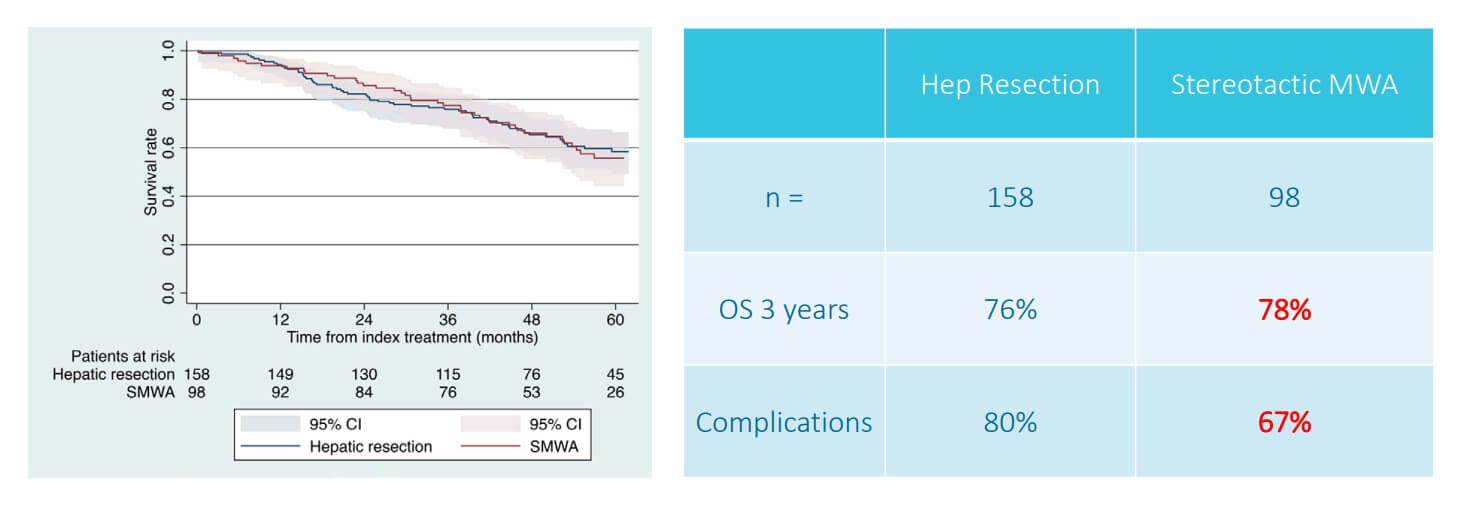
العلاج بالتبريد: القضاء على الأورام من خلال التجميد المُتحكم به
العلاج بالتبريد (الاجتثاث بالتبريد) هو علاج جديد لسرطان القولون في المرحلة الرابعة يستخدم البرودة الشديدة، عادةً أقل من -75 درجة مئوية باستخدام النيتروجين السائل، لتجميد وتدمير الخلايا السرطانية. يتم إدخال مسابير Probes إلى الورم لإنشاء "كرة ثلجية" يتم تجميدها وإذابتها عدة مرات لضمان التدمير الكامل.
توفر هذه التقنية رؤية ممتازة أثناء الإجراء، مما يسمح بالتحكم الدقيق للحفاظ على الأنسجة السليمة. يمكن أن يكون فعالاً بالقرب من الأوعية الدموية وهياكل حرجة أخرى. غالباً ما يتم استخدام الاجتثاث بالتبريد لـ:
- المرضى الذين يعانون من أورام متعددة
- الأورام في المواقع الصعبة لإجراء الجراحة
- المرشحون ذوي المخاطر الجراحية العالية
| السِمة | العلاج القياسي | الأساليب المبتكرة |
|---|---|---|
| معدل البقاء على قيد الحياة لمدة عامين | ~٪25 للسرطان المتقدم | ~٪60 للسرطان المتقدم |
| معدل الاستجابة | معدل استجابة تحت 10٪ | ٪65-45 استجابة إيجابية |
| مدة العلاج | عدة دورات على مدار أشهر | ما يصل إلى 4 جلسات |
| الآثار السلبية | كبيرة وشائعة (غثيان شديد، وضعف شديد، وثعلبة كاملة، وضعف المناعة، والتهاب الجلد) | آثار خفيفة في الغالب (تقتصر غالباً على شعور مؤقت بعدم الارتياح في موقع العلاج) |
| التكلفة في ألمانيا | 80.000 € - 150.000 € دورة كاملة | 25.000 € - 60.000 € دورة كاملة |
| التكلفة في بريطانيا العظمى | 90.000 € - 165.000 € دورة كاملة | 70.000 € - 120.000 € دورة كاملة |
| التكلفة في الولايات المتحدة الأمريكية | 100.000 € - 180.000 € دورة كاملة | 100.000 € - 150.000 € دورة كاملة |
بناءً على بيانات Booking Health السريرية. تختلف تكاليف العلاج النهائية وفقاً لعوامل محددة للمريض، ومدة الرعاية داخل المستشفى Inpatient، واحتياجات الإشراف الطبي المستمر، والنفقات الإضافية التي تُغطي التشخيص، وتنسيق السفر، وترتيبات السكن.
الأمل في الإجراء: قصة نجاح علاج ريبيكا
عندما تلقت ريبيكا كافانو من الولايات المتحدة تشخيصها بالمرحلة الرابعة من سرطان القولون مع نقائل الكبد، عرفت أنها بحاجة إلى استكشاف كل سُبل العلاج الممكنة. قادها بحثها عن أحدث العلاجات إلى مختبرات LDG الدكتور جانسوج بيرج في ألمانيا، وهو مستشفى مرموق متخصص في العلاج المناعي بالخلايا المتغصنة.
"بينما لا أستطيع حتى الآن التعليق على النتائج الجسدية لعلاجي الطبي في المستشفى، إلا أنني أستطيع أن أشهد على حقيقة أن رعايتي في ألمانيا كانت منظمة بشكلٍ جيد للغاية،" تشارك ريبيكا. لقد أثبت دعم التنسيق الذي قدمته Booking Health / Med Expert Consulting أنه لا يُقدر بثمن في التنقل عبر العلاج الدولي.
أعربت ريبيكا عن تقديرها الخاص لنظام الدعم الشامل: "في جميع المراحل، كانت كيت ونسيم ومساعدتي / مترجمتي في الموقع كلوديا ممتازين. سار كل شيء في الموعد المحدد، وشعرت بدعم جيد فيما يتعلق بتخطيط السفر، والتواصل مع الطبيب، وطاقم المستشفى."
تُسلط تجربتها الضوء على جانب بالغ الأهمية في البحث عن علاجات مبتكرة للسرطان في الخارج – حيث يوجد فريق دعم متخصص يعمل على تجاوز حواجز اللغة، وتنسيق الرعاية، وضمان التواصل السلس بين المرضى والفرق الطبية. بالنسبة لمرضى السرطان المتقدم، يمكن لهذا المستوى من التنظيم والدعم أن يُحدث فرقاً بين الشعور بالإرهاق والشعور بالتمكين للحصول على أفضل رعاية ممكنة.
تجلّت ثقة ريبيكا في عملية العلاج في كلمتها الختامية: "سأحجز مجدداً!". هذا يُعبّر عن راحة البال التي تنبع من إيجاد نهج علاجي ونظام دعم مناسب، حتى في مواجهة حالة عدم اليقين التي تُصاحب السرطان في مراحله المتقدمة.

إيجاد أمل وفريق العلاج المناسب
على الرغم من أن تشخيص المرحلة 4 يمثل تحديات كبيرة، إلا أن مشهد علاج المرحلة الرابعة من سرطان القولون والمرحلة 4 من سرطان المستقيم تغير بشكلٍ كبير. إن تطوير وتوافر العلاجات المبتكرة مثل HIPEC و PIPAC و TACE والعلاج بالخلايا المتغصنة Dendritic cell therapy وتقنيات الاجتثاث المتقدمة، بالاشتراك مع الأساليب الشخصية الموجهة بالملف الجزيئي، يعني أن المرضى لديهم المزيد من الخيارات وأمل أكبر من أي وقتٍ مضى.
بالمقارنة مع الطرق التقليدية لعلاج السرطان المتقدم، أظهرت هذه الطرق المبتكرة إمكانية تحسين معدلات الاستجابة ونتائج البقاء على قيد الحياة لدى مرضى مختارين. من الجدير بالذكر أن العديد من العلاجات المبتكرة طفيفة التوغل وترتبط بآثار جانبية أقل حدة وانتشاراً مثل تلك التي نراها عادةً في العلاج الكيميائي التقليدي، الذي يمكنه أن يساعد في الحفاظ على جودة حياة المريض أثناء العلاج.
بالنسبة للمرضى وعائلاتهم الذين يواجهون التشخيص، من الضروري السعي للحصول على علاج سرطان الأمعاء للمرحلة 4 في مراكز متخصصة تُقدم تقييمات شاملة وإمكانية الوصول إلى مجموعة واسعة من أساليب العلاج، بما في ذلك خيارات مبتكرة وتجريبية. يمكن لفريق متعدد التخصصات المساعدة في التعامل مع تعقيدات خيارات العلاج وتحديد أفضل مزيج من العلاجات المصممة خصيصاً للظروف الخاصة بكل فرد وخصائص الورم.
التشخيص النهائي لم يعد نقطة نهاية تلقائية؛ بل أصبح دعوة لاستكشاف أفضل علاج لسرطان القولون في المرحلة الرابعة المتوفر اليوم. مع الخبرة المناسبة، والنهج الشخصي، وإمكانية الوصول إلى علاجات مبتكرة، يمكن للعديد من المرضى تحقيق سيطرة ذات معنى على المرض، وإطالة البقاء على قيد الحياة، والتمتع بجودة حياة جيدة. هناك العديد من الأسباب التي تدعو إلى التفاؤل.
شريكك الموثوق: كل خطوة على الطريق مع Booking Health
يُعد إيجاد أفضل استراتيجية علاج لحالتك السريرية مهمةً صعبة. كونك مُرهق بالفعل من جلسات العلاج المتعددة، واستشارة العديد من المتخصصين، وتجربة مختلف التدخلات العلاجية، قد تجد نفسك في حيرة من أمرك بسبب المعلومات التي يقدمها الأطباء لك. في مثل هذه الحالة، من السهل اختيار خيار مباشر أو اتباع بروتوكولات علاجية موحدة ذات قائمة طويلة من الآثار السلبية بدلاً من اختيار خيارات علاج مبتكرة عالية التخصص.
لاتخاذ قرار مستنير والحصول على خطة مخصصة لإدارة السرطان، والتي سيتم تصميمها لتناسب حالتك السريرية المحددة، استشر الخبراء الطبيين في Booking Health. نظراً لكونها في الطليعة في تقديم أحدث الابتكارات الطبية لمدة 12 عاماً، تتمتع Booking Health بخبرة قوية في إنشاء برامج معقدة لإدارة السرطان في كل حالة. كشركة مرموقة، تُقدم Booking Health خطط علاج مخصصة للمرحلة الرابعة من سرطان القولون، مع حجز مباشر للمستشفى ودعم كامل في كل مرحلة، بدءاً من العمليات التنظيمية ووصولاً إلى المساعدة أثناء العلاج. نحن نُقدم:
- تقييم وتحليل التقارير الطبية
- تطوير برنامج الرعاية الطبية
- اختيار موقع العلاج المناسب
- إعداد الوثائق الطبية وإرسالها إلى المستشفى المناسب
- الاستشارات التحضيرية مع الأطباء لتطوير برامج الرعاية الطبية
- نصائح الخبراء أثناء الإقامة في المستشفى
- رعاية المتابعة بعد عودة المريض إلى بلده الأصلي بعد إكمال برنامج الرعاية الطبية
- الاهتمام بالإجراءات الرسمية كجزء من التحضير لبرنامج الرعاية الطبية
- تنسيق وتنظيم إقامة المريض في بلد أجنبي
- المساعدة في الحصول على التأشيرات وتذاكر الطيران
- مُنسق شخصي ومترجم فوري مع دعم على مدار الساعة 24/7
- ميزانية شفافة بدون تكاليف خفية
الصحة جانب لا يُقدر بثمن في حياتنا. ينبغي تفويض إدارة شيء هش لكنه ثمين فقط إلى خبراء يتمتعون بخبرة مُثبتة وسمعة طيبة. Booking Health هو شريك جدير بالثقة يساعدك في الحصول على صحة أقوى وجودة حياة أفضل. اتصل بمستشارنا الطبي لمعرفة المزيد عن إمكانيات العلاج الشخصي باستخدام أساليب مبتكرة لسرطان الأمعاء النقيلي مع متخصصين رائدين في هذا المجال.
الرعاية الدولية للسرطان: قصص المرضى مع Booking Health
الأسئلة الشائعة حول المرحلة الرابعة من سرطان القولون وإجاباتها
أرسل طلب للعلاجتشمل خيارات العلاج للمرحلة الرابعة من سرطان القولون الجراحة، والعلاج الكيميائي، والعلاج الإشعاعي، والأساليب المبتكرة مثل HIPEC و PIPAC و TACE والعلاج بالخلايا المتغصنة، والاجتثاث الحراري. تعتمد التوقعات على العوامل الفردية، حيث توفر العلاجات الحديثة فرصاً أفضل من الطرق التقليدية.
تُظهر العلاجات التقليدية معدل بقاء على قيد الحياة لمدة خمس سنوات بنسبة 13٪، لكن العلاجات المتطورة تُحقق معدل بقاء على قيد الحياة لمدة عامين يصل إلى 60٪. يؤدي التشخيص المبكر والعلاج الشخصي إلى تحسين النتائج بشكلٍ كبير وإطالة متوسط العمر المتوقع.
معدلات الاستجابة للعلاج الكيميائي القياسي أقل من 10٪، في حين تُظهر الطرق المبتكرة استجابات إيجابية تتراوح من 45٪ إلى 65٪. غالباً ما تُثبت علاجات الخط الثاني والأساليب الموجهة فعالية أكبر عندما لا تُحقق علاجات الخط الأول النتائج المرجوة للمرض المتقدم.
نعم، المرحلة الرابعة من سرطان القولون تعني حسب التعريف أن السرطان انتشر إلى أعضاء بعيدة. تؤثر هذه الحالة الخطيرة على 22٪ من مرضى سرطان القولون والمستقيم عند التشخيص، وتتطلب تخطيط علاج شامل وفوري.
يُعد الكبد هو العضو الأكثر شيوعاً، يليه الرئتان، والصفاق (الغشاء البريتوني)، والعقد اللمفاوية البعيدة. يمكن أن يحدث تورط العظام والكلى، على الرغم من أنه أقل تكراراً من نقائل الكبد والرئة.
نعم، يُقدم العلاج بالخلايا المتغصنة Dendritic cell therapy ومثبطات نقاط التفتيش خيارات واعدة للعلاج المناعي. تعمل هذه العلاجات عن طريق تدريب جهاز المناعة لديك على التعرف على الخلايا السرطانية وتدميرها، والتغلب على المرض على المستوى الخلوي، مما قد يؤدي إلى تحقيق هدأة مع الحد الأدنى من الآثار الجانبية.
تمثل تقنيات HIPEC و PIPAC و TACE والعلاج بالخلايا المتغصنة Dendritic cell therapy أساليب رائدة. تُظهر الأبحاث الحالية أن هذه الأساليب المبتكرة تُحقق معدلات بقاء على قيد الحياة وجودة حياة أفضل مقارنةً بالعلاجات التقليدية، مما يوفر أملاً حقيقياً.
يستخدم العلاج الموجه اختبارات جينية لتحديد طفرات محددة مثل RAS و BRAF و HER2. يضمن هذا النهج الشخصي حصول المرضى على العلاج الأكثر فعالية بناءً على الخصائص الفريدة للورم لديهم، مما يُحسن فرص النجاح.
قد يتم النظر في الجراحة عندما يقتصر انتشار السرطان على مناطق قابلة للإزالة في الكبد أو الرئتين. على الرغم من أنها ليست شافية، إلا أن الجراحة يمكنها أن تساعد المرضى على العيش لفترة أطول وإدارة الأعراض مثل الانسداد.
يمكن أن تختلف معدلات البقاء على قيد الحياة للمرحلة الرابعة من سرطان القولون حسب العمر، حيث غالباً ما يحصل المرضى الأصغر سناً على نتائج أفضل. تُحقق العلاجات المتقدمة الآن معدلات بقاء على قيد الحياة تصل إلى 60٪ لمدة عامين، مع اتباع أساليب مداومة تساعد في استدامة التحسينات عبر جميع الفئات العمرية.
يتطلب اكتشاف انتشار السرطان عادةً إجراء التصوير، مثل التصوير المقطعي المحوسب CT scan، أو التصوير بالرنين المغناطيسي MRI، أو التصوير المقطعي بالإصدار البوزيتروني PET scan، للبحث عن نقائل. قد تُشير التغيرات في أنماط البراز إلى تقدُم موضعي يتطلب تقييماً.
على الرغم من أن العلاجات التقليدية حققت نجاحاً محدوداً، إلا أن الأساليب المبتكرة مثل HIPEC تُقدم خيارات محتملة الشفاء لمرضى مختارين. المفتاح هو عدم الاستسلام – فالتشخيص النهائي لا يعني بالضرورة حكماً بالموت بشكل تلقائي مع التطورات التي نشهدها اليوم.
يبلغ معدل البقاء على قيد الحياة لمدة عامين للمرحلة الرابعة من سرطان القولون حوالي 25٪ مع العلاج الكيميائي القياسي. ومع ذلك، يمكن أن يصل إلى 60٪ لدى المرضى الذين عولجوا باستخدام أساليب متقدمة (مثل HIPEC أو TACE أو PIPAC أو العلاج بالخلايا المتغصنة Dendritic cell therapy).
كيف يتم مقارنة معدل البقاء على قيد الحياة الخالي من التقدم بين العلاجات القياسية والعلاجات المبتكرة للمرحلة الرابعة من سرطان القولون؟
غالباً ما يوفر العلاج الكيميائي التقليدي للمرحلة الرابعة من سرطان القولون بضعة أشهر فقط من البقاء على قيد الحياة الخالي من التقدم. من ناحيةً أخرى، يمكن للخيارات المبتكرة والموجهة أن تُطيل البقاء إلى 8-12 شهراً أو أكثر.
في المرحلة الرابعة من سرطان القولون، يُحقق العلاج الكيميائي التقليدي معدلات استجابة أقل من 10٪. في المقابل، فإن الأساليب العلاجية الحديثة (مثل TACE أو العلاج المناعي بالخلايا المتغصنة) يمكن أن تحقق معدلات استجابة تصل إلى 45-65٪.
يتضمن العلاج القياسي للمرحلة الرابعة من سرطان القولون عدة دورات علاجية على مدى عدة أشهر. في المقابل، يمكن إكمال العلاجات الموضعية المتقدمة في ما يصل إلى أربع جلسات، تتبع كل منها فترة استراحة قصيرة.
في علاج المرحلة 4 من سرطان القولون، قد يُسبب العلاج الكيميائي القياسي تعب شديد، وغثيان، وتساقط الشعر، وكبت المناعة. وبالمقارنة، فإن العلاجات الموضعية أو القائمة على المناعة عادةً ما تؤدي فقط إلى شعور طفيف ومؤقت بعدم الارتياح أو حُمى منخفضة الدرجة.
تُحافظ العلاجات المبتكرة للمرحلة الرابعة من سرطان القولون عموماً على جودة الحياة بشكل أفضل بكثير مقارنةً بالأنظمة العلاجية التقليدية. يُبلغ المرضى عن تعافي أسرع، وآثار جانبية أقل، وعودة أسرع إلى ممارسة أنشطتهم اليومية المعتادة بعد إجراءات مثل TACE أو العلاج بالخلايا المتغصنة.
العلاج الأكثر فعالية للمرحلة الرابعة من سرطان القولون هي الإدارة متعدد الوسائط وتعتمد على الانتشار النقيلي. ففي حال تورط الصفاق قد يُنظر في إجراء جراحة الاختزال الخلوي مع HIPEC أو PIPAC؛ ويمكن علاج المرض الذي يُهيمن على الكبد باستخدام TACE. يمكن إضافة العلاج بالخلايا المتغصنة كخيار داعم للمناعة.
يتم تحقيق أفضل النتائج في المراكز ذات الحجم والعدد الكبير من الحالات والمعالجات والتي تتمتع بخبرة في علاج أورام القولون والمستقيم المتقدمة. المستشفيات الألمانية التي تُقدم HIPEC و PIPAC وإجراءات الأشعة التداخلية (مثل TACE) وتوفر إمكانية الوصول إلى العلاج المناعي بالخلايا المتغصنة – تتيح استراتيجيات علاج فردية (تتجاوز العلاج الجهازي وحده).
تُعتبر ألمانيا وجهةً رائدة (بسبب المبادئ التوجيهية المُنظمة لعلاج الأورام وتوفر علاجات موضعية إقليمية متقدمة). تدمج المراكز المتخصصة علاجات HIPEC و PIPAC و TACE والعلاجات القائمة على المناعة – مما يسمح باتباع أساليب مُصممة خصيصاً للمرضى الذين يعانون من مرض نقيلي أو مقاوم للعلاج.
اختر العلاج في الخارج وستحصل بالتأكيد على أفضل النتائج!
المؤلفون:
تم تحرير المقال من قبل خبراء طبيين وأطباء معتمدين من مجلس الأطباء الدكتورة ناديجدا إيفانيسوفا و الدكتور بوغدان ميخالنيوك. لعلاج الحالات المشار إليها في المقال، يجب استشارة الطبيب؛ المعلومات الواردة في المقالة ليست مخصصة للتطبيب الذاتي!
سياستنا التحريرية، التي توضح بالتفصيل التزامنا بالدقة والشفافية، متاحة هنا. انقر على هذا الرابط لمراجعة سياساتنا.
المصادر:
اقرأ:
علاج المرحلة الرابعة من سرطان القولون في ألمانيا
قائمة المقالات:
- ماذا يعني سرطان الأمعاء في المرحلة الرابعة: عندما ينتشر السرطان
- خيارات العلاج القياسية: الجراحة، والعلاج الكيميائي، والعلاج الإشعاعي
- العلاجات المتقدمة لانتشار السرطان في البطن
- العلاج الدقيق لنقائل الكبد – TACE
- لقاحات الخلايا المتغصنة: تدريب جسمك لمكافحة السرطان
- الاختبارات الجينية: تصميم علاج للسرطان الذي لديك
- تدمير الورم بدون جراحة: العلاجات بالحرارة والبرودة
- الأمل في الإجراء: قصة نجاح علاج ريبيكا
- إيجاد أمل وفريق العلاج المناسب
- شريكك الموثوق: كل خطوة على الطريق مع Booking Health
- الأسئلة الشائعة حول المرحلة الرابعة من سرطان القولون وإجاباتها
لا تعرف من أين تبدأ؟
اتصل بـ Booking Health

